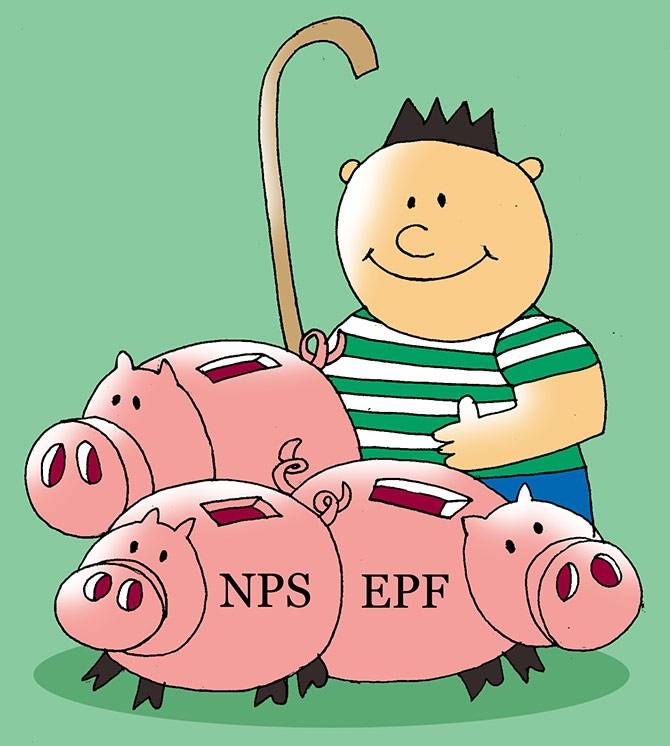If a risk taker and young, NPS would suit her/him.
Otherwise, s/he should go for EPF.
Illustration: Uttam Ghosh/Rediff.com

A legal change to allow Employees Provident Fund Organisation (EPFO) members to switch to the National Pension System (NPS) and back if they wish has not passed the hurdle of the law ministry.
The proposal was to add a new clause 16AB to the EPF Act to enable this.
The law ministry apart, there were objections from others, too, at an inter-ministerial discussion. "Hence, it is stuck," a senior labour ministry official said.
NPS was started in 2004; all government employees have to join.
In 2009, it was opened for the non-government sector, where it is not compulsory.
The draft addition reads: 'An employee who has joined the New Pension Scheme may join the Scheme framed under this Act, by an application to the (provident fund) commissioner. Provided that he/she will be treated as a new entrant to the Schemes framed under the Act.'
Which gives a better return?
At the outset, it seems that NPS does, even in debt instruments.
For example, EPF gave an 8.69% average annual return for the five years till 2016-2017, while NPS gave over 13% in case of any of its schemes -- equity, government debt or corporate debt.
However, this is because of different accounting methods adopted by EPS and NPS, says Manoj Nagpal, chief executive, Outlook Asia Capital.
EPS, he said, follows what is called the hold to maturity and accrual based accounting norm, whereas NPS uses a market valuation norm.
For instance, if NPS and EPF buy a government security at a coupon rate of 6.5% for 15 years, then EPF will declare 6.5% interest after the first year, while NPS will take into account the decrease in interest rates.
If because of the latter the securities turn 5% more attractive, it would add this to the coupon rate and say the return is 11.5%.
However, both NPS and EPF have to hold the security till maturity, he explains.
So, for a subscriber, the security would actually give the same return.
Equity gives an added advantage to NPS, he said.
While government staffers may opt for an investment plan where 50% could be invested in equity, private sector employers may choose one where 75% could be used for equity.
In EPF, only up to 10 of the incremental fund could be invested in exchange-traded funds.
Vishal Dhawan, chief financial planner, Plan Ahead Wealth Advisors, said investment in EPF or NPS depends upon age and risk appetite of a subscriber.
If a risk taker and young, NPS would suit him. Otherwise, he should go for EPF.
EPF gives an attractive return in terms of fixed income schemes.
Returns in similar schemes are 8.1% in the case of Public Provident Fund, 6.75% to 7% in fixed term bank deposits and 6% to 6.25% in the case of tax bonds.
The EPF return was more than double the consumer price inflation at 3.63% in November, he added.
Dhawan said it should also be noted that NPS would attract a tax at the time of withdrawal; if you come in the highest slab, a third of the amount would be taken away.
This is not so with EPF.
If one opts for an annuity, one can save on tax in the case of NPS, but this return is low and would also attract tax.












 © 2025
© 2025